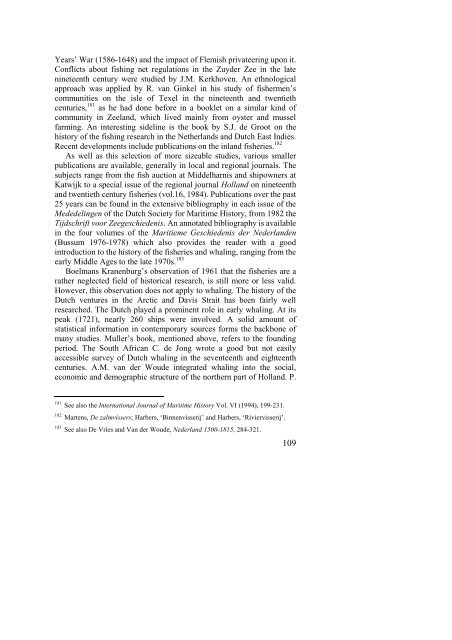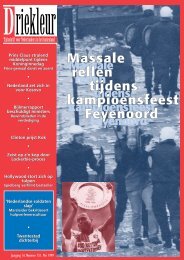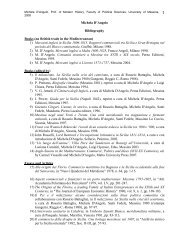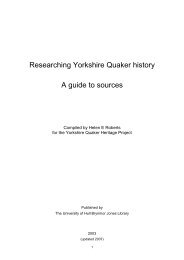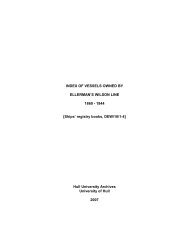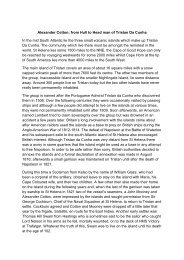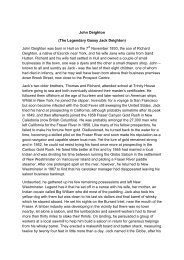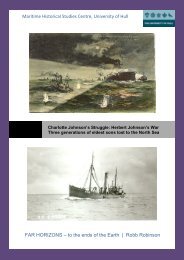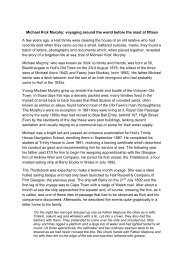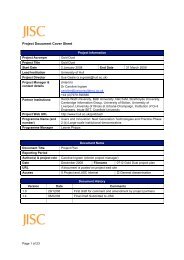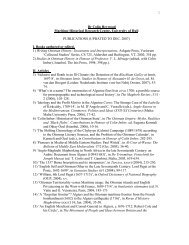The North Atlantic Fisheries, 1100-1976 - University of Hull
The North Atlantic Fisheries, 1100-1976 - University of Hull
The North Atlantic Fisheries, 1100-1976 - University of Hull
Create successful ePaper yourself
Turn your PDF publications into a flip-book with our unique Google optimized e-Paper software.
Years’ War (1586-1648) and the impact <strong>of</strong> Flemish privateering upon it.<br />
Conflicts about fishing net regulations in the Zuyder Zee in the late<br />
nineteenth century were studied by J.M. Kerkhoven. An ethnological<br />
approach was applied by R. van Ginkel in his study <strong>of</strong> fishermen’s<br />
communities on the isle <strong>of</strong> Texel in the nineteenth and twentieth<br />
centuries, 181 as he had done before in a booklet on a similar kind <strong>of</strong><br />
community in Zeeland, which lived mainly from oyster and mussel<br />
farming. An interesting sideline is the book by S.J. de Groot on the<br />
history <strong>of</strong> the fishing research in the Netherlands and Dutch East Indies.<br />
Recent developments include publications on the inland fisheries. 182<br />
As well as this selection <strong>of</strong> more sizeable studies, various smaller<br />
publications are available, generally in local and regional journals. <strong>The</strong><br />
subjects range from the fish auction at Middelharnis and shipowners at<br />
Katwijk to a special issue <strong>of</strong> the regional journal Holland on nineteenth<br />
and twentieth century fisheries (vol.16, 1984). Publications over the past<br />
25 years can be found in the extensive bibliography in each issue <strong>of</strong> the<br />
Mededelingen <strong>of</strong> the Dutch Society for Maritime History, from 1982 the<br />
Tijdschrift voor Zeegeschiedenis. An annotated bibliography is available<br />
in the four volumes <strong>of</strong> the Maritieme Geschiedenis der Nederlanden<br />
(Bussum <strong>1976</strong>-1978) which also provides the reader with a good<br />
introduction to the history <strong>of</strong> the fisheries and whaling, ranging from the<br />
early Middle Ages to the late 1970s. 183<br />
Boelmans Kranenburg’s observation <strong>of</strong> 1961 that the fisheries are a<br />
rather neglected field <strong>of</strong> historical research, is still more or less valid.<br />
However, this observation does not apply to whaling. <strong>The</strong> history <strong>of</strong> the<br />
Dutch ventures in the Arctic and Davis Strait has been fairly well<br />
researched. <strong>The</strong> Dutch played a prominent role in early whaling. At its<br />
peak (1721), nearly 260 ships were involved. A solid amount <strong>of</strong><br />
statistical information in contemporary sources forms the backbone <strong>of</strong><br />
many studies. Muller’s book, mentioned above, refers to the founding<br />
period. <strong>The</strong> South African C. de Jong wrote a good but not easily<br />
accessible survey <strong>of</strong> Dutch whaling in the seventeenth and eighteenth<br />
centuries. A.M. van der Woude integrated whaling into the social,<br />
economic and demographic structure <strong>of</strong> the northern part <strong>of</strong> Holland. P.<br />
181 See also the International Journal <strong>of</strong> Maritime History Vol. VI (1994), 199-231.<br />
182 Martens, De zalmvissers; Harbers, ‘Binnenvisserij’ and Harbers, ‘Riviervisserij’.<br />
183 See also De Vries and Van der Woude, Nederland 1500-1815, 284-321.<br />
109


